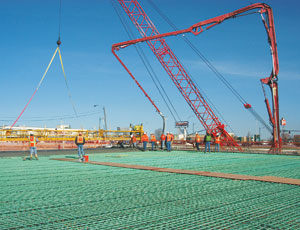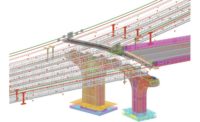For some, it is millions of dollars’ worth of deferred paving work. For others, it is billion-dollar highway expansions. Nationwide, state transportation departments are putting projects on hold due to shrinking budgets. Dwindling tax revenue from gas and other sources, a bleak economic environment and continued high materials costs are all taking their toll. An anticipated infrastucture-heavy stimulus package from the new Obama administration cannot come soon enough for industry officials.

“In my 30 years in the industry, I’ve never seen anything like this,” says Tom Warne, former Utah Dept. of Transportation chief and founder of Tom Warne and Associates, LLC, South Jordan, Utah. “DOTs have cut back at certain times—for example, during the delays of highway bills—and they get conservative while they wait for the reauthorization to occur. But it is unprecedented this time.”
UDOT announced on Nov. 20 that it would halt nearly $4 billion of transportation projects. “We are trying to do what is responsible,” says UDOT deputy director Carlos Braceras. “It makes no sense to find yourself in a hole and keep digging. We were at the point that if we kept proceeding with our heads in the ground we would send projects into construction and then not be able to pay the bills. That is not what we want.”
Among the 50 Utah projects on hold is the $2.6-billion design-build Interstate 15 CORE project in Utah County, the two-phase $290-million Mountain View Corridor between Salt Lake and Utah counties, and a $118-million I-15 expansion to Highland in Utah County.
Local contractors are dismayed with UDOT’s decision, although there is still $2 billion worth of work under contract that will proceed. “It makes me wonder what [UDOT] is thinking,” says Kip Wadsworth, president of Ralph L. Wadsworth Construction, Draper. “Instead of taking a scalpel to this, they took an ax,” he complains.
William Buechner, vice president of economics and research for the American Road and Transportation Builders Association, testified before the U.S. House of Representatives on Oct. 30, citing 13 states that have or are considering deferring new projects. Since then, Utah, Georgia and Kansas have joined the list.
Through December and January, Kansas DOT will let bids worth about a third of its originally planned $314 million. “If we can get additional federal money through whatever means, we could let them relatively quickly next year,” says Jerry Younger, the state engineer. “If those projects are delayed a year or two out, then the roadways will continue to deteriorate.”
Younger says no internal layoffs are expected, unlike in Virginia where its DOT announced last month that it may cut up to $2.6 billion off its six-year plan. Neighboring Maryland is taking aim at $1.1 billion of project funding that will be deferred in its six-year plan. Transportation Secretary John D. Porcari announced in September that the state’s transportation trust fund would receive $115 million less than projected this year due to a downturn in the motor fuel tax, vehicle titling tax and other fees. “Without the expected revenue, we have to defer new projects until we can afford them,” he said. Those projects include highways and transit.
Hopes hinge in large part on a promised stimulus package with infrastructure projects and possibly a national infrastructure bank as a centerpiece. ARTBA’s Buechner told the House Committee on Transportation and Infrastructure that thousands of projects could begin within 30 to 60 days of the start of such a stimulus program.
In urging that the program include the potential for 100% federal funding of “ready to go” projects, he noted, “Although the national unemployment rate is just over 6%, the unemployment rate among construction workers in September was 9.9%, almost four percentage points higher....During the past three years, highway construction contractors have shrunk their payrolls by 30,000 workers as state and local highway agencies have postponed projects in response to skyrocketing construction costs and tight budgets.”
|
| Source : STATE DOTS |
Transportation contractors continue to worry. “It affects every facet of our business,” says Scott Parson, president of Staker Parson Cos., Ogden, Utah, of UDOT’s announcement. “We really can’t keep things going when we don’t have a pipeline of work. I don’t think we know all the background behind why UDOT did what they did.”
UDOT’s Braceras says he is optimistic that many projects will be put back into the rotation after the state legislative session ends in mid-March and that Utah’s economy will rebound quickly.
Warne agrees, saying, “The states with good programs will rebound. The sales tax won’t change as a funding vehicle—it’s a relatively fair tax.” He recalls that in 1985, voters passed a half-cent tax increase for Maricopa County projects, built upon a projection of 12% growth. “Then the recession hit. It was 4% growth, and $6 billion became $2 billion. But eventually the economy recovered, and the projects did get built.”




Post a comment to this article
Report Abusive Comment